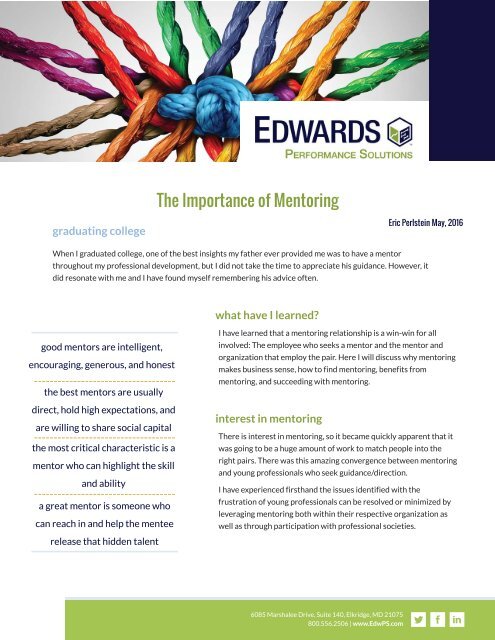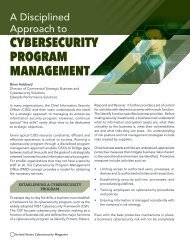The Importance of Mentoring – Eric Perlstein
Create successful ePaper yourself
Turn your PDF publications into a flip-book with our unique Google optimized e-Paper software.
<strong>The</strong> <strong>Importance</strong> <strong>of</strong> <strong>Mentoring</strong><br />
graduating college<br />
<strong>Eric</strong> <strong>Perlstein</strong> May, 2016<br />
When I graduated college, one <strong>of</strong> the best insights my father ever provided me was to have a mentor<br />
throughout my pr<strong>of</strong>essional development, but I did not take the time to appreciate his guidance. However, it<br />
did resonate with me and I have found myself remembering his advice <strong>of</strong>ten.<br />
what have I learned?<br />
good mentors are intelligent,<br />
encouraging, generous, and honest<br />
------------------------------------<br />
the best mentors are usually<br />
direct, hold high expectations, and<br />
are willing to share social capital<br />
------------------------------------<br />
the most critical characteristic is a<br />
mentor who can highlight the skill<br />
and ability<br />
------------------------------------<br />
a great mentor is someone who<br />
can reach in and help the mentee<br />
release that hidden talent<br />
I have learned that a mentoring relationship is a win-win for all<br />
involved: <strong>The</strong> employee who seeks a mentor and the mentor and<br />
organization that employ the pair. Here I will discuss why mentoring<br />
makes business sense, how to find mentoring, benefits from<br />
mentoring, and succeeding with mentoring.<br />
interest in mentoring<br />
<strong>The</strong>re is interest in mentoring, so it became quickly apparent that it<br />
was going to be a huge amount <strong>of</strong> work to match people into the<br />
right pairs. <strong>The</strong>re was this amazing convergence between mentoring<br />
and young pr<strong>of</strong>essionals who seek guidance/direction.<br />
I have experienced firsthand the issues identified with the<br />
frustration <strong>of</strong> young pr<strong>of</strong>essionals can be resolved or minimized by<br />
leveraging mentoring both within their respective organization as<br />
well as through participation with pr<strong>of</strong>essional societies.<br />
6085 Marshalee Drive, Suite 140, Elkridge, MD 21075<br />
800.556.2506 | www.EdwPS.com
advantages <strong>of</strong> mentoring<br />
I am a huge fan <strong>of</strong> mentoring, and an advocate <strong>of</strong> performance measurement through pr<strong>of</strong>essional development. I have<br />
never seen or experienced measurement tracking and reporting that supported mentoring before other than supporting a<br />
career path through attaining specific credentials, continuing education, and new job opportunities. Initial advances do<br />
emphasize mentorships contributed to career advancement, satisfaction, and salary attainment. Over the last 10 years, I<br />
have found great success through my connectivity with PMI globally and with the Baltimore Chapter <strong>of</strong> PMI; providing<br />
mentoring to high school and college students through our partnerships with UMBC, Big Brothers/Big Sisters, and<br />
Morgan State University. Included with this success, reaching out to the millennial generation augments the legitimacy to<br />
access their informal social and communication networks. <strong>The</strong> key reality is having a mentor who is willing to introduce<br />
and vouch for the mentee in senior leadership circles within the organization and in the pr<strong>of</strong>essional society, which<br />
establishes demand and supply for mentoring.<br />
how to obtain mentoring: 5 steps to a mentoring relationship<br />
Most organizations do not have a formal mentoring program. So the question becomes, how can an individual employee<br />
reach out and find a mentor? Instead <strong>of</strong> asking someone to be your mentor, I would suggest a multi-pronged approach<br />
using these five steps.<br />
1. Identify why you need a mentor. Reasons might include:<br />
• Connections, introductions, visibility, job skills, industry knowledge, management skills, and communication skills<br />
• Help with goal setting and problem solving<br />
• Psycho-social support for work-family pressures, discrimination, coping with disappointment, and/or developing<br />
self-esteem<br />
2. Consider who might have the characteristics <strong>of</strong> a good mentor and would assist with your identified needs in a<br />
mentoring relationship<br />
3. Create an outreach plan to find your mentor<br />
• Check for a corporate mentoring program with your HR or training department<br />
• Identify and approach a senior leader<br />
• Look within community organizations<br />
• Network at conferences and seminars<br />
• Ask for referrals within industry groups<br />
• Reach out using social media such as Twitter, Facebook, and LinkedIn<br />
• Consider someone you highly respected at a former employer<br />
4. Decide how you will introduce yourself and request the mentoring relationship.<br />
• Contact the potential mentor via phone, email, meeting, social media, or a letter<br />
• Include in your introduction: the specific reason you thought this person would make a good mentor for you, you<br />
understand that the person is busy and you will expect only a reasonable amount <strong>of</strong> time from them, the areas<br />
you would like to focus on in the mentorship, and the benefits <strong>of</strong> being a mentor<br />
5. Follow-up, follow-up, follow-up until you have received your potential mentor’s response to your request so you can<br />
build a mentoring relationship
set reasonable expectations about mentoring<br />
One <strong>of</strong> the biggest challenges faced with mentoring is what can an<br />
employee reasonably expect from a mentoring relationship. On the<br />
low involvement end? On the most desirable end?<br />
My experience includes aligning the amount <strong>of</strong> involvement required<br />
is dependent on the objective(s) <strong>of</strong> the mentorship. For example, a<br />
mentorship focused on career pathing, networking or sponsorship<br />
may require a significant time commitment as the plan for the<br />
mentorship is developed.<br />
A mentorship devoted to social support or on helping solve specific<br />
challenges may take a more case-by-case approach. Mentors and<br />
mentees should plan to communicate a minimum <strong>of</strong> once per month.<br />
<strong>The</strong> guideline may change into 2-3 times a month or every 6 weeks.<br />
<strong>The</strong> mentor and mentee should also plan to meet individually for a<br />
few hours per month. Mentees might choose to follow up on a<br />
strategy discussed in the mentoring meetings. Mentors should be<br />
brushing up on a particular area <strong>of</strong> interest, creating learning<br />
activities, or coordinating meetings to introduce the mentee to<br />
colleagues who can help them in those certain areas.<br />
From the mentee perspective, there can be a known unknown as to<br />
what must an employee with a mentor deliver to the mentoring<br />
relationship for the relationship to succeed (What does the<br />
employee need to give back?). One <strong>of</strong> the exciting things about<br />
mentoring is that the mentors gain as much as the mentees.<br />
conclusion<br />
A mentee who was struggling with her career path had the choice<br />
between two very different job openings within her company. She<br />
was stuck on which one to choose. I did not hand her the answer, or<br />
tell her which one was best.<br />
Instead, I asked the right questions so she could determine the best<br />
course herself. I suggested two approaches to help make the best<br />
decision. First, to create a Pros/Cons list and evaluate which made<br />
the most sense. Second, being a process flow guru, I suggested she<br />
implement a decision approach based on a weighted evaluation<br />
criteria methodology. She told me my guidance had positive<br />
influences as she planned for her future. She was not sure she would<br />
have come to the best conclusion without myassistance and she now<br />
has a framework for how to make difficult decisions.<br />
specific benefits<br />
• career development, increased salary,<br />
promotions and visibility<br />
• increased confidence<br />
• greater understanding <strong>of</strong> the<br />
organization<br />
• sharpened skills<br />
• expanded networks<br />
• assistance with specific problems<br />
extras<br />
<strong>Mentoring</strong> creates advantages not just<br />
for the mentee and mentor but also for<br />
the company the mentor and mentee<br />
work. Starting or expanding a corporate<br />
mentoring program can do wonders for<br />
employee retention, commitment,<br />
development and succession planning.<br />
<strong>Mentoring</strong> (as well as being a mentee) has and will continue to be a<br />
great experience. My mentor helped me understand my strengths<br />
and weaknesses, to plan for the near future and beyond, to know<br />
what it will take to get there, and to discuss it with my superiors. I<br />
was impressed with my mentor’s guidance. It was a life-changing<br />
experience and I gained perspective I could not acquire on my own.












